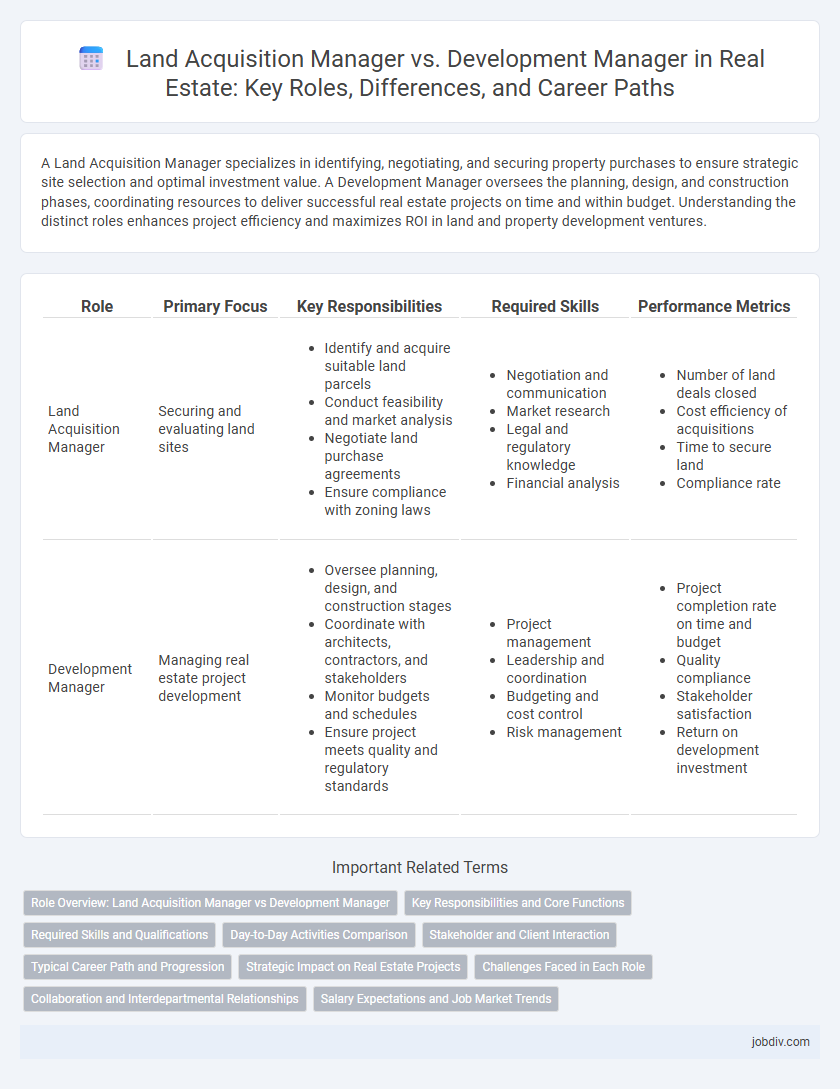A Land Acquisition Manager specializes in identifying, negotiating, and securing property purchases to ensure strategic site selection and optimal investment value. A Development Manager oversees the planning, design, and construction phases, coordinating resources to deliver successful real estate projects on time and within budget. Understanding the distinct roles enhances project efficiency and maximizes ROI in land and property development ventures.
Table of Comparison
| Role | Primary Focus | Key Responsibilities | Required Skills | Performance Metrics |
|---|---|---|---|---|
| Land Acquisition Manager | Securing and evaluating land sites |
|
|
|
| Development Manager | Managing real estate project development |
|
|
|
Role Overview: Land Acquisition Manager vs Development Manager
A Land Acquisition Manager specializes in identifying, evaluating, and securing suitable properties for development, negotiating purchases and managing due diligence processes to ensure strategic land procurement aligns with company goals. A Development Manager oversees the planning, coordination, and execution of real estate projects from concept to completion, managing budgets, timelines, regulatory compliance, and stakeholder communication to maximize project profitability and quality. Both roles require strong market analysis skills, but Land Acquisition Managers focus on site acquisition while Development Managers drive the entire project lifecycle.
Key Responsibilities and Core Functions
A Land Acquisition Manager focuses on identifying, negotiating, and securing land parcels suitable for development, conducting feasibility studies, and managing due diligence processes to ensure compliance with zoning and regulatory requirements. A Development Manager oversees the entire project lifecycle, including planning, design coordination, budgeting, permitting, and construction management to ensure timely and cost-effective project delivery. Both roles require strong market analysis and stakeholder management skills, but the Land Acquisition Manager emphasizes site procurement while the Development Manager drives project execution and completion.
Required Skills and Qualifications
A Land Acquisition Manager must possess strong negotiation skills, expertise in property law, and proficiency in market analysis to identify and secure prime land parcels. Development Managers require project management experience, knowledge of zoning regulations, and the ability to coordinate multidisciplinary teams for successful property development. Both roles demand strategic planning capabilities and a solid understanding of real estate finance, but the Land Acquisition Manager focuses more on deal-making while the Development Manager emphasizes project execution.
Day-to-Day Activities Comparison
A Land Acquisition Manager primarily focuses on identifying and negotiating land purchases, conducting due diligence, and coordinating with legal teams to secure property titles, ensuring strategic site selection aligns with company goals. In contrast, a Development Manager oversees project planning, liaises with architects and contractors, monitors construction progress, and manages budgets to ensure timely completion of real estate developments. Both roles require strong stakeholder communication, but the Land Acquisition Manager emphasizes property procurement while the Development Manager handles site development and delivery.
Stakeholder and Client Interaction
Land Acquisition Managers primarily engage with property owners, local authorities, and legal teams to negotiate and secure land parcels essential for development projects. Development Managers coordinate with architects, contractors, investors, and community stakeholders to oversee project planning, approvals, and execution, ensuring alignment with client expectations and regulatory standards. Effective communication skills enable both roles to manage diverse stakeholder interests and facilitate seamless progress from acquisition to project completion.
Typical Career Path and Progression
A Land Acquisition Manager typically begins their career in real estate research or sales, progressing to roles that involve identifying and securing land parcels for development, often advancing to senior acquisition or portfolio management positions. In contrast, a Development Manager usually starts in project coordination or assistant development roles, moving up to manage entire construction and planning processes, often rising to director or vice president of development. Both paths offer opportunities to transition into executive roles, but Land Acquisition focuses more on strategic land procurement while Development emphasizes overseeing complex project execution.
Strategic Impact on Real Estate Projects
A Land Acquisition Manager drives the strategic foundation of real estate projects by identifying and securing prime land parcels that align with market demand and regulatory frameworks, directly influencing project feasibility and long-term value. The Development Manager translates this strategic groundwork into actionable plans, overseeing design, permitting, and construction phases to optimize asset performance and return on investment. Both roles are pivotal in shaping project lifecycle outcomes, with land acquisition establishing opportunities and development management ensuring execution aligns with strategic objectives.
Challenges Faced in Each Role
Land Acquisition Managers encounter challenges such as identifying viable properties, negotiating with multiple stakeholders, and navigating complex zoning regulations to secure parcels that meet project goals. Development Managers face difficulties in coordinating construction schedules, managing budgets, and ensuring compliance with environmental and safety standards throughout the building process. Both roles require adept problem-solving skills but differ in focus: acquisition emphasizes strategic site selection and legal hurdles, while development centers on project execution and operational management.
Collaboration and Interdepartmental Relationships
Land Acquisition Managers and Development Managers collaborate closely to ensure seamless project progression from site identification to construction. Land Acquisition Managers focus on securing strategic properties, working with legal, finance, and planning teams to negotiate purchases and conduct due diligence. Development Managers coordinate with design, engineering, and marketing departments to transform acquired land into viable real estate projects, fostering strong interdepartmental communication to align timelines and budgets.
Salary Expectations and Job Market Trends
Land Acquisition Managers typically earn between $85,000 and $130,000 annually, reflecting their expertise in securing property for development projects, while Development Managers command higher salaries ranging from $100,000 to $160,000 due to their broader responsibilities overseeing project execution and profitability. The real estate job market shows growing demand for Development Managers driven by increasing urbanization and complex projects, whereas Land Acquisition Managers face steady demand tied to land availability and regulatory environments. Salary expectations are influenced by experience, regional market conditions, and the scale of development portfolios managed.
Land Acquisition Manager vs Development Manager Infographic

 jobdiv.com
jobdiv.com